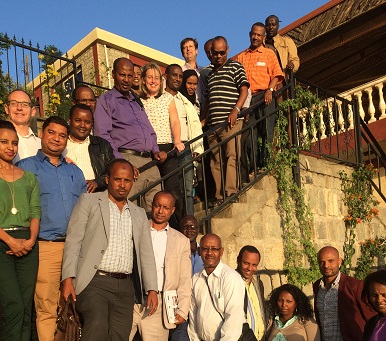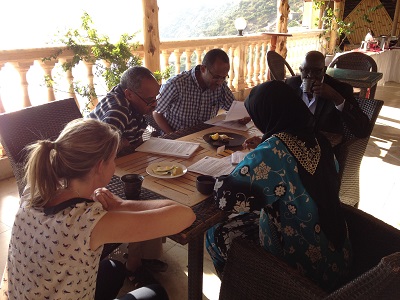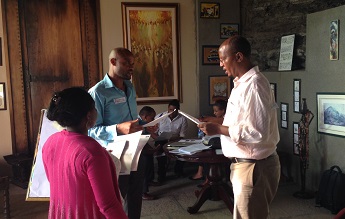Training primed Ethiopian climate negotiators for COP21
Training primed Ethiopian climate negotiators for COP21
In the run up to the Paris climate conference (COP21), the Government of Ethiopia invited CDKN and Ricardo Energy & Environment to provide advanced training to their negotiators. How do you train people to be skilled climate negotiators? And how did this training work out? Katherine Cooke reports.
The Least Developed Country (LDC) group and Alliance of Small Island States (AOSIS) comprise more than half of the countries in the UNFCCC and are experiencing the most severe impacts of climate change. However, despite this, historically their voices have not been heard as strongly in the negotiations as developed countries or the large developing nations such as China, India and Brazil. This is the result of a range of barriers, particularly around capacity gaps. For instance, Dr Mulugeta Mengist Ayalew, Director of Climate Change Affairs in the Office of the Prime Minister of the Federal Democratic Republic of Ethiopia, explained that in the past “members of the team, often drawn from line ministries and regions, constantly changed”, making continuity and development challenging.
[caption id="attachment_62124" align="alignleft" width="300"] Ethiopian negotiators on the CDKN-sponsored advanced skills training before COP21 in Paris.[/caption]
Ethiopian negotiators on the CDKN-sponsored advanced skills training before COP21 in Paris.[/caption]
Paris presented a huge opportunity for these developing countries to redress this balance. But for fast-developing nations such as Ethiopia, to ensure that their priority concerns were reflected in the Paris Agreement, they needed to participate effectively in the negotiations. Given the complexities of the negotiations at COP21, it is clear that this needed to go beyond an understanding of the key technical issues under negotiation. Rather, the countries that negotiated effectively in Paris did so by developing and deploying clear strategies, use of skilled negotiators and alignment of their national positions with those of their wider negotiating groups.
In October 2015, leaders of the Ethiopian delegation took bold steps to prepare for these crucial negotiations, by bringing together their core delegation with regional representatives to spend a week focussed on internal coordination and training meetings. The aim was to establish alignment between national climate change policies and international objectives and to develop a clear country position on agenda items and the latest negotiating text of the Paris Agreement.
Directly following the Ethiopian internal meetings, 25 negotiators from the Ethiopian delegation took part in negotiator training provided by CDKN and Ricardo Energy & Environment on the 7th – 10th October at the Asham Africa Lodge in Debrezeit. This training built on our previous work with the Ethiopian delegation and was directly requested by the Ministry of Environment and Forest (MEFCC).
The workshop was led by Chris Dodwell (former head of the UK delegation to the climate negotiations) and Hans Verolme (former head of the WWF delegation). Using their combined experience of climate negotiations, we designed a training programme which focused on practical skills and problem-based learning exercises, including complex simulated negotiation sessions in increasingly formal negotiation settings. The training aimed to build capacity, strengthen the coordination of the national team and equip delegates with specific skills to navigate the negotiations.
Bilateral negotiations training
Many of the most important discussions that took place in Paris were in informal settings – huddles in the corners of negotiating rooms, bilateral discussions in the corridors or cafes of the COP21 site at Le Bourget. Delegates prepared for this through simulated bilateral discussions where they were able to practice building common positions through the use of effective communication and influencing skills. Real data from four African countries’ climate plans (Intended Nationally Determined Contributions or INDCs) was provided as discussion material and each participant was assigned to represent one of these countries.
The aim of this exercise was for each delegate to initiate and sustain discussions with other country representatives, with the aim of identifying country priorities and sensitivities contained in the INDC documents. During the debrief, delegates noted that the use of icebreakers, such as general knowledge of other countries and humour, are of great importance, even when exchanging information in formal international negotiations.
[caption id="attachment_62126" align="alignleft" width="300"] A negotiating group exercise at the training.[/caption]
A negotiating group exercise at the training.[/caption]
Negotiating Group exercise
Delegates were asked to prepare and present opening statements - on Article 2, the ‘purpose’ of the draft Paris agreement - for the coordination meetings of two different negotiating groups: the African Group of Negotiators and the Least Developed Countries group. Through this exercise, delegates were able to practice how to best use concise, well-structured evidence-based arguments to engage with and influence their counterparts.
In drafting and presenting their statements, each group member needed to consider not only Ethiopia’s priorities but also how they might align with other members of the developing country groups in the negotiations such as the Africa Group of Negotiators (AGN) and Least Developed Countries (LDC) Group. They also needed to have an understanding of and be sensitive to the different interests represented by these and other negotiating groups in order to present a strategy that would build alliances and reach universal agreement.
Contact Group exercise
Understanding the culture and communication styles of different countries was key to the alliances that were formed in Paris across traditional negotiating blocs. Delegates were introduced to this concept through the research of British linguist, Richard Lewis, who has charted negotiation patterns and styles used in more than 25 different cultures. Delegates found this to be particularly useful in preparing for the simulated negotiation exercise in a contact group setting.
In this exercise, delegates were required to place themselves in the shoes of different developed and developing countries. In a simulated contact group setting, where Hans Verlome was cast as an austere and unforgiving Chair, participants practiced negotiating as the chairs of different negotiating groups as they skilfully negotiated four key issues for the Paris COP: 1) the adequacy of INDCs, 2) differentiation, 3) legal status and 4) how to record INDCs in a Paris agreement.
Tensions rose during the debate around the adequacy of contributions from different countries; however, by the final phase of the negotiations, consensus on some if not all issues was reached.
The final session aimed to help the negotiating team to prepare for external factors such as managing risks, effective team coordination and preparing their strategy. Sessions included dealing with the media and civil society and engagement in side events at the negotiations.
[caption id="attachment_62128" align="alignleft" width="300"] Role playing to get ready for Paris.[/caption]
Role playing to get ready for Paris.[/caption]
Reflections after the Paris climate conference…
Ethiopia’s Climate Resilient Green Economy strategy (CRGE), combined with ambitious targets in the country’s INDC, have established Ethiopia as a global leader in setting a clear pathway for sustainable economic growth.
At COP21, the Ethiopian delegation was able to demonstrate a well-coordinated, clear and powerful negotiating position. This reflected the progress Ethiopia has already made, but also helped to build the country's case in securing the international support that will be required for implementation.
Ethiopia’s internal coordination meetings in early October combined with the CDKN and Ricardo Energy & Environment training both provided support in helping Ethiopia to achieve this position. Dr Ayalew explained that “as a result of this training, I believe that Ethiopia is now in a better position to effectively participate in international climate change negotiations”. At the October training, members of the team acquired important speaking, listening and negotiating skills and strategies. In addition, we are now better in dealing with media and civil societies while promoting our interests”. Recognising the training’s potential to build Ethiopia’s negotiating capacity in the longer term, he added that “members of the core group can now provide the training for new people” and that “steps to institutionalise capacities built as a result of the two trainings will need to be taken by us”.
The outcome of COP21 appears to signal a positive shift for the prospects of Least Developed Countries in international climate negotiations. Nonetheless, a multitude of further negotiations will be required in the coming years to arm the agreement with the mechanisms that it requires to increase ambition further. Training sessions such as those delivered in Ethiopia will help to ensure the spirit of broad country participation that was generated in Paris continues during this process.
Ethiopia continues to stand as an active member of both the AGN and LDC Group. Its influence, further bolstered by this training, will be crucial to successfully negotiating the challenging journey that lies ahead post-Paris towards and to securing a future for climate vulnerable countries.
Katherine Cooke is a Senior Consultant for International Climate Change Policy, Ricardo Energy & Environment.
Image top right, courtesy Rwanda Ministry of Environment; images above courtesy Katherine Cooke.
